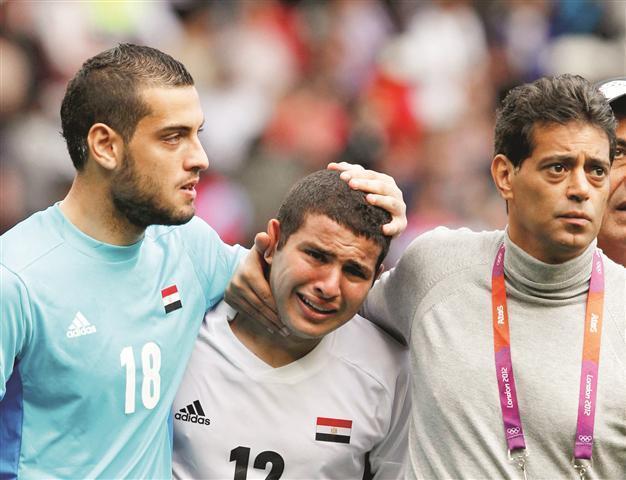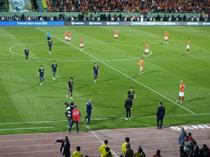Identity politics shaping game in Middle East, North Africa
James M. Dorsey ISTANBUL - Hürriyet Daily News

Egypt coach Hany Ramzy (R) and goalkeeper Mohammed Bassam (L) console Eslam Ramadan after the national team’s defeat at the hands of Japan during the Olympic Games in London. REUTERS photo
Hany Ramzy returned to Egypt from the London Olympics a football hero and a model in a country and a region in which identity politics rather than national identity often governs the beautiful game.A Coptic Christian and one-time legendary national football team captain in a squad whose former national coach Hassan Shehata set Muslim piety as a criterion for inclusion on a par with skill, Ramzy, the coach of Egypt’s Olympic football team, symbolizes what is possible as well as the immense problems Middle Eastern and North African nations have in coming to grips with their ethnic and religious minorities.
Popular uprisings in the past year in countries like Syria and Bahrain have turned sectarian, as are protests in Saudi Arabia’s Eastern Province and the fallout of the insurgency in Syria into neighboring countries like Turkey, Lebanon, Jordan and Iraq. Football teams across the region in Iran, Israel, Iraqi Kurdistan, Egypt, Algeria, Palestine and Jordan are often as much about sports as they are about identity.
Ramzy led his team to the quarterfinals in London in the wake of 18 months of political volatility and violence. In one incident last October, 28 people, mostly Copts, were killed and 212 injured when security forces and the military attacked demonstrators protesting against the demolition of a church in Upper Egypt.
Symbolic success
“Egypt’s participation in the Olympics could not be more symbolic of the role sports plays as a means to regain national pride and social unity,” said journalist Mustafa Abdelhalim in an analysis on Common Ground that was as much about hope as it was about reality.
To be sure, Copts play for Egyptian premier league teams, as do Kurds in Iraq, Palestinians in Israel, Berbers in Algeria and Azeris in Iran. Ramzy is credited with helping Egypt win the 1998 Africa Cup of Nations championship. And the Egyptian team has no doubt abandoned its religious discrimination under American coach Bob Bradley.
But major teams in the region, including Traktorsazi in the Iranian province of Eastern Azerbaijan, Bnei Sakhnin and Beitar Jerusalem in Israel and Jeunesse Kabyle in Algeria as well as the national teams of Iraqi Kurdistan and Palestine are key tools in projecting national or sectarian identities. So are the occasionally violent protests of their supporters.
“In Egypt, there is a problem that many people don’t even consider. This problem relates to not allowing the Copts to play in the national teams of sports, especially football which is the most popular game in Egypt. Marginalization of young Copts by the football association and the administrations of Egyptian clubs resulted in having no Coptic players in the core teams. Youth teams have very few Copts and they are laid off as soon as they reach certain age and never take the chance to promote,” says Safwat Freeze Ghali, writing on the Copts United website.
Football discrimination
Charging that discrimination against Copts encourages discrimination by Muslims and anger among Copts, who account for some 10 percent of all Egyptians, Ghali speaks out of personal experience.
“I suffered from this problem with my son who was born in 1995 and has a great talent in football.
Many people have said so after they saw him playing. My son then started in a small club, but never took a chance to play. His coach treats him so badly and his colleagues make fun of his Christian name.
His coach told him: I won’t let you touch the ball [play in the team] and never ask me why! We got fed up and I took him to a bigger club and they liked him very much and promised to recruit him but they never did. Then, I moved him to another club where they liked him too, but when the coach [learned] his name [a Christian name], he said: We’ll see, later!” Ghali said.
Under the leadership of Shehata, a legendary pro-Mubarak coach who resigned last year after leading Egypt to three successive African titles, the unwritten rule was that only practicing Muslims could join the national team. Players prayed before games for God’s intervention and offered up prayers of thanks for goals and victories. To join the team, players had to pass a pious behavior litmus test while also demonstrating their football skills.
“Without it, we will never select any player regardless of his potential,” Shehata, who dumped a talented player for visiting a nightclub rather than a mosque, was quoted as saying. “I always strive to make sure that those who wear the Egypt jersey are on good terms with God.”
Shehata’s statements and policy sparked furor but no change. At the time, it apparently never occurred to Sheheta that his righteous squad may have lost its 2010 World Cup qualifier game because God loves Algeria and its team, too. It seemingly also never occurred to world football body FIFA to stop a dangerous trend in its tracks. Imagine what would happen if other national teams had follow Egypt’s example; if England had insisted that its players worship in the Church of England; Italy made Catholicism the team’s central tenet or Germany booted all Turkish Muslims off the field.
Still, there could be a chance for more integration, Abdelhalim said, pointing to a precedent in London.
“In June 2012, London’s Wembley Stadium was the site of a ‘faith and football’ day that united students from Muslim, Christian and Jewish schools. This event was planned by the Three Faiths Forum (3FF), a U.K.-based organization dedicated to building relationships between people of all faiths, and the Football Association, which officially oversees the sport in the country,” he said.
“Egyptians could replicate this example by creating leagues to promote intergroup and interfaith cooperation. These teams could include anyone who wants to participate in the sport and make Egyptians’ shared interest in sports a tool for a more inclusive society,” he said.
















